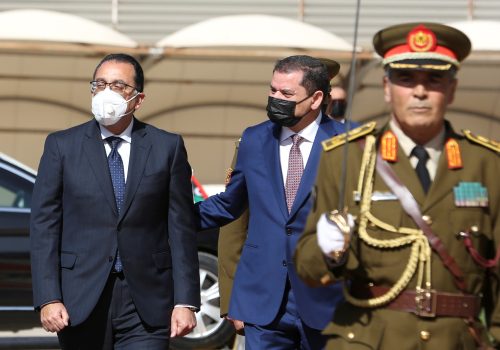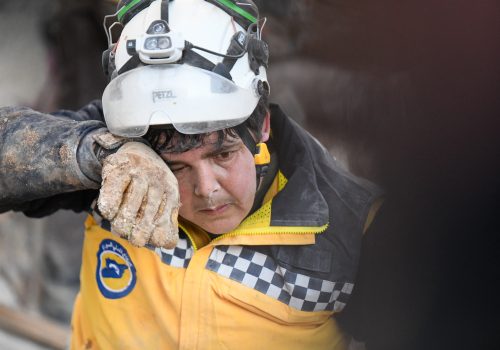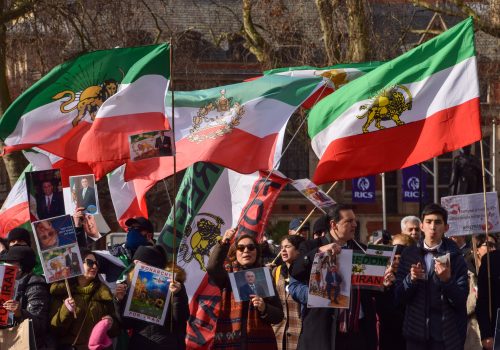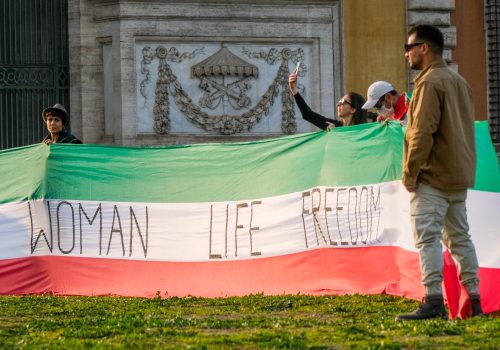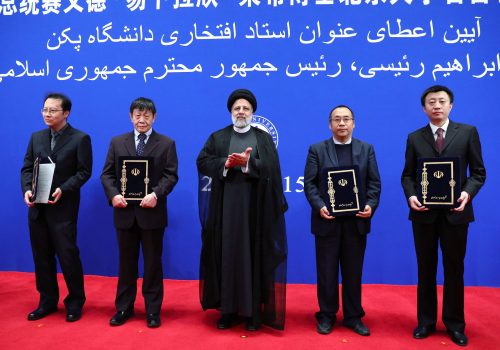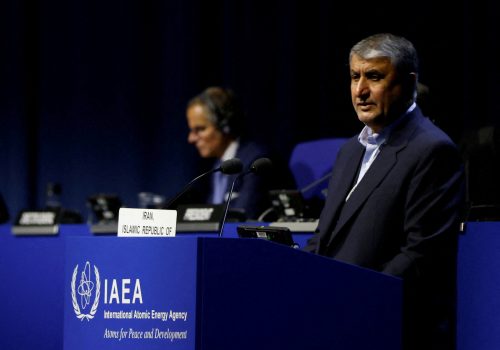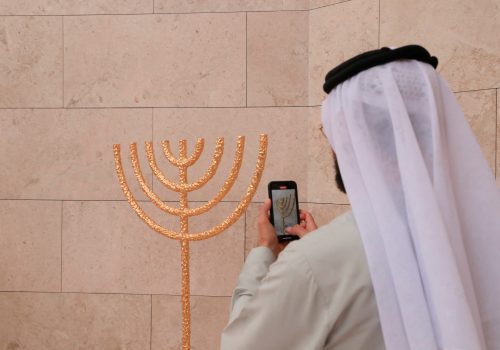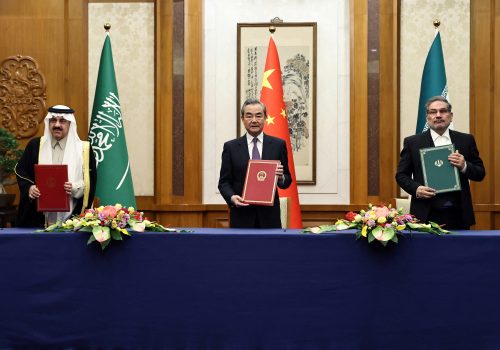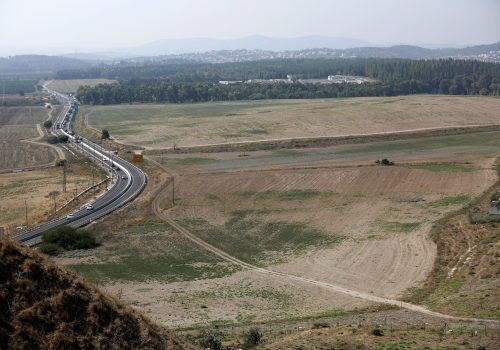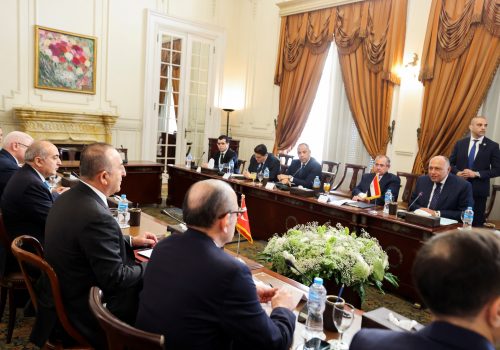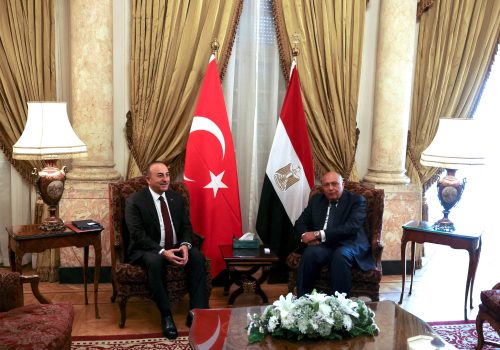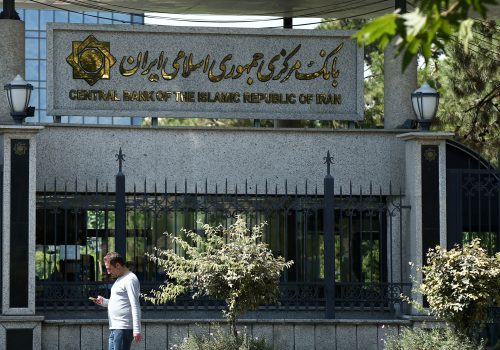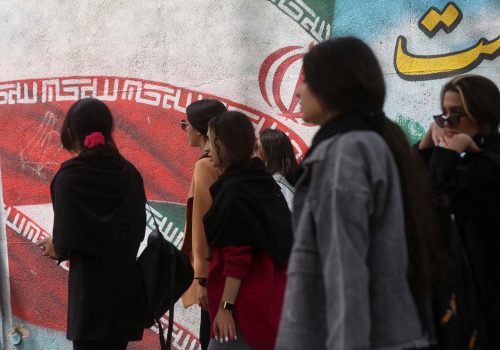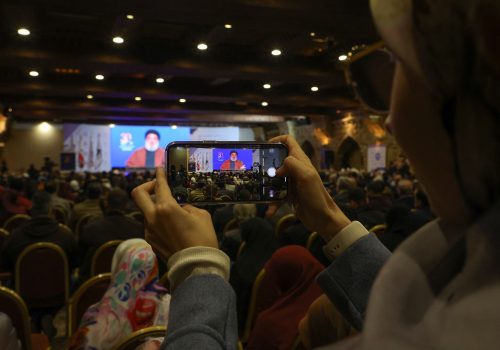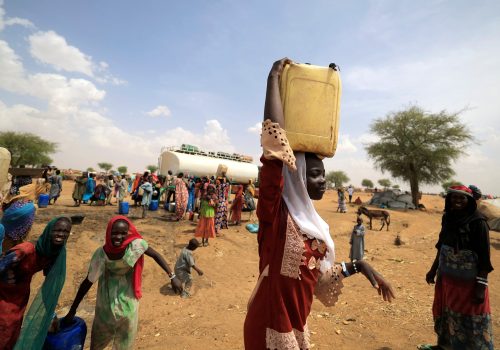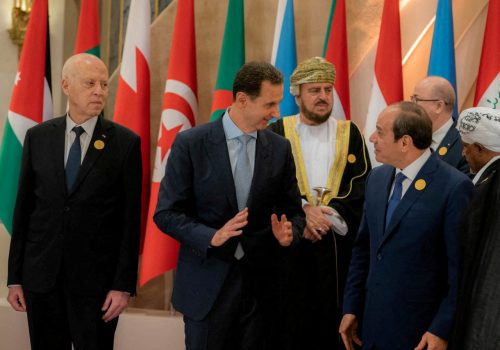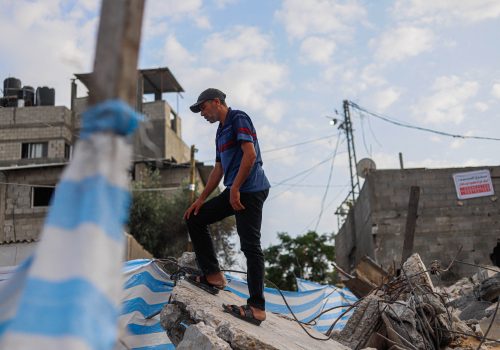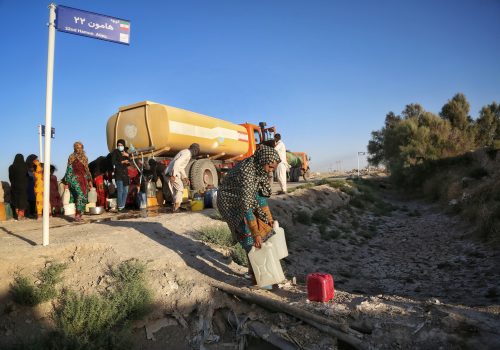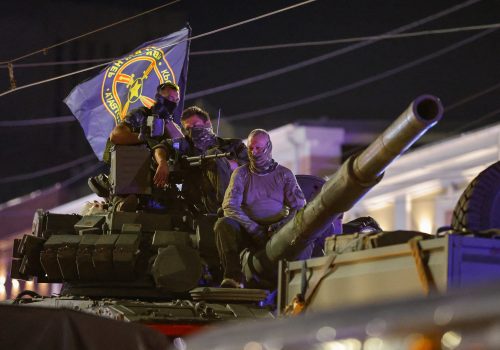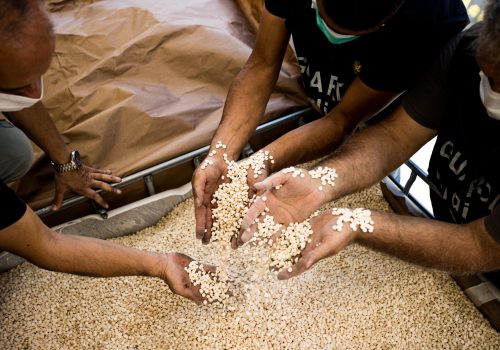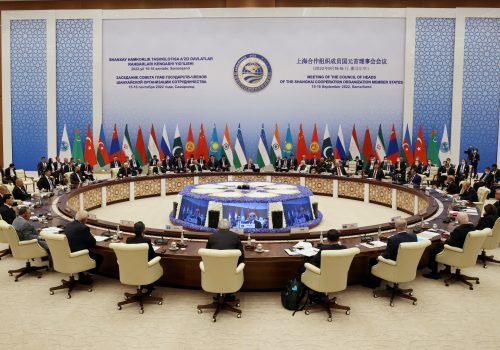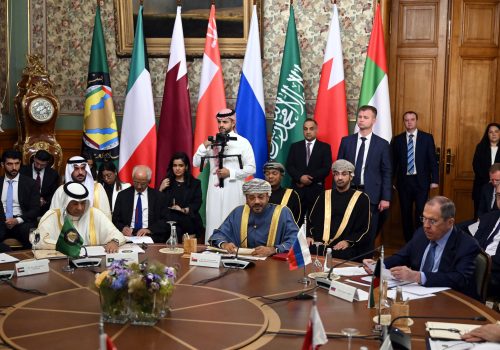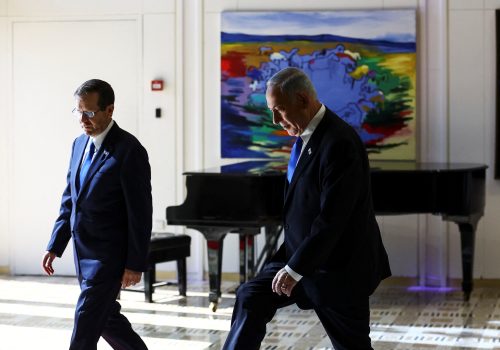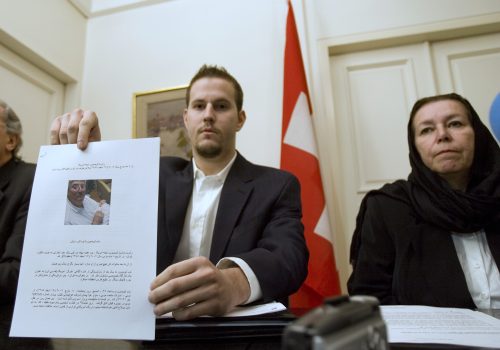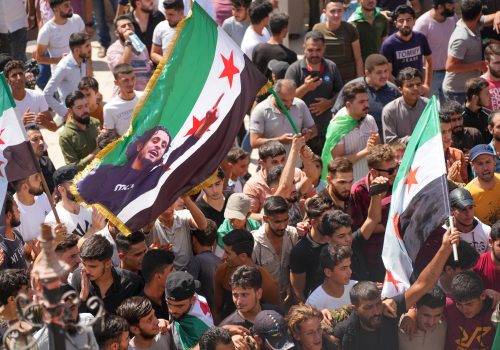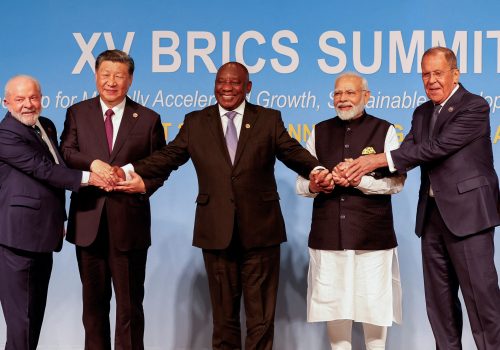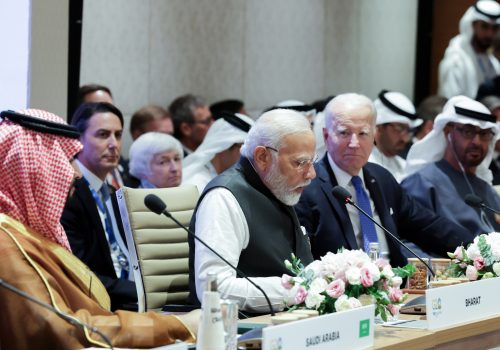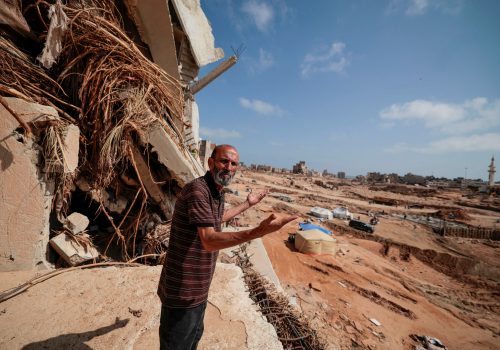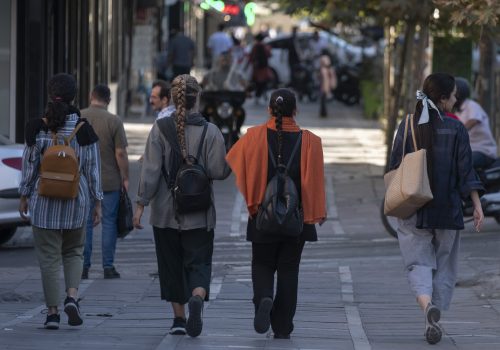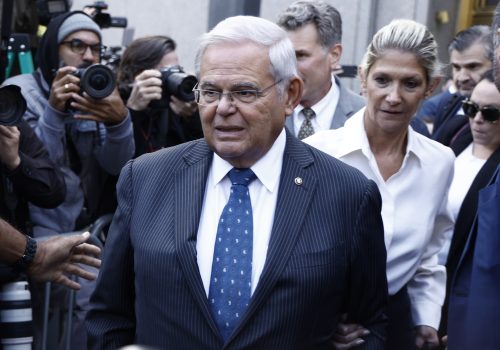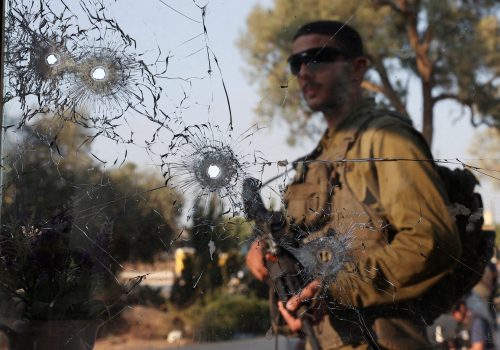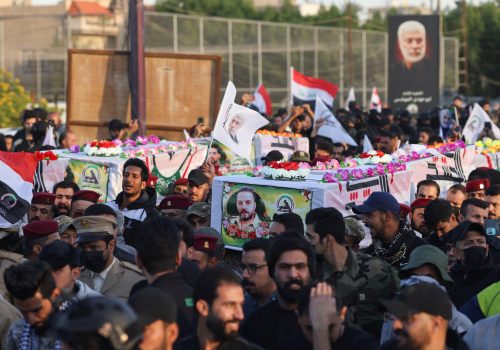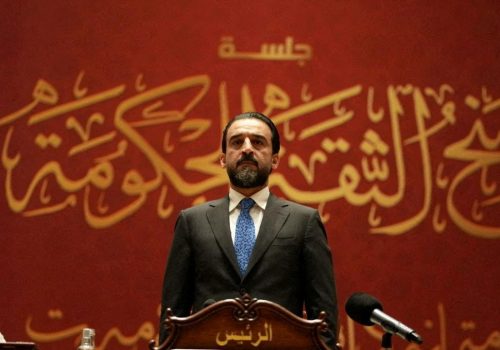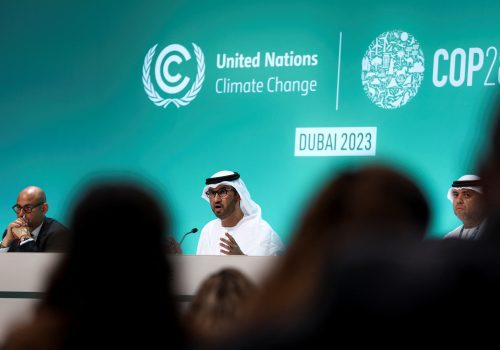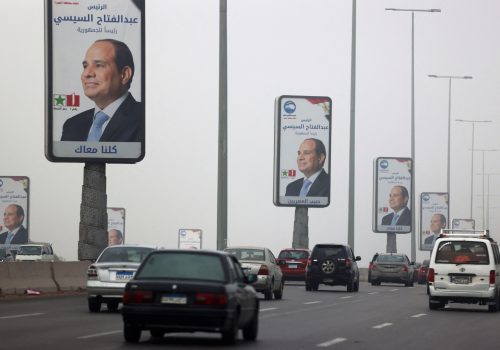2023: A year in the Middle East
2023 was a tumultuous and tragic year for the Middle East and North Africa (MENA). This year saw the outbreak of wars in Sudan and between Israel and the Gaza Strip, devastating natural disasters in Morocco, Libya, Syria, and Turkey, and a crackdown on protestors and women in Iran.
2023 also produced moments of hope and diplomatic feats. MENA countries were included in development organizations and plans that aimed to bolster the region’s economic prosperity; Iran and Saudi Arabia restored diplomatic relations; and the Abraham Accords continued to prosper.
Learn about the region’s biggest moments:
January 1: Israeli Minister Itamar Ben-Gvir decisively visits Temple Mount (Haram al-Sharif)
The year had a rocky start as Israel’s controversial newly appointed minister of national security, Itamar Ben-Gvir, visited the Temple Mount, also known as Haram al-Sharif (Noble Sanctuary). Since Israel won the holy sites in the 1967 war, it granted the administrative authority of al-Aqsa Mosque, the Temple Mount, and the surrounding complex to the Jordanian Islamic Waqf. Under the status quo, the site is open to Muslim worshipers while Jewish visitors are allowed only at certain times and are not permitted to pray there.
“Ben Gvir, who is the leader of the extreme-right Otzma Yehudit party, has previously been convicted for supporting terrorism and inciting racism,” highlighted senior fellow Ksenia Svetlova. Given his background, Ben-Gvir’s January 1 visit—and subsequent visits later in the year—angered Palestinians, Arab-Israelis, and the wider Arab and Muslim world, as he has previously voiced discontent with the status quo, making his visit appear threatening to Muslim rights at the holy sites in Jerusalem.
January 5: Libya’s rival governments agree to develop a constitutional basis for elections
Since the 2011 uprising against Libyan dictator Muammar Gaddafi, the country has faced violence, uncertainty, and division, resulting in two parallel governments. In January, after more than a decade of conflict and failed attempts at unity, the two governments of Libya—the Government of National Unity in the west and the Government of National Stability in the east—entered into negotiations to find a constitutional basis to end the conflict and hold elections for a single, unity government.
The talks took place in Cairo after Egypt volunteered to host. Aguila Saleh, the speaker of the Libyan House of Representatives, represented Tobruk and eastern Libya. In contrast, Tripoli and western Libya were represented by Khaled Al-Mishri, the head of Libya’s Higher Council of State. The representatives agreed to create a roadmap for the election process in the talks. The prime ministers of both governments also passed along the country’s constitutional document for approval from their respective legislatures.
February 6: Deadly 7.8 magnitude earthquake hits Turkey and Syria
On February 6, a devastating 7.8 magnitude earthquake struck southern Turkey and northwest Syria, killing over 55,000 people and affecting 15.7 million more. The damage was widespread; homes, schools, and hospitals were destroyed as the earthquake left entire cities and villages in ruin. While it was known that war-torn Syria would not have the capacity to respond to disaster, the earthquake exposed the inadequacy of Turkey’s response system.
Despite international aid, rescue and rebuilding efforts in Turkey were insufficient, with help slow to reach many areas. The earthquake has also had detrimental economic effects. The rebuilding efforts are expected to cost upward of $130 billion—over one-eighth of Turkey’s GDP—while many industries and livelihoods have also been destroyed. But as one Syrian told senior fellow Arwa Damon hours after the earthquake struck: “It did what the Assad regime and Russians wanted to do to us all along.”
February 10: Georgetown Institute for Women, Peace, and Security leads Iranian opposition gathering
An Iranian diaspora opposition coalition known as the Alliance for Freedom and Democracy in Iran (AFDI) officially came together at an event hosted by the Georgetown Institute for Women, Peace, and Security months after anti-establishment protests kicked off in September 2022.
Although the conference’s scope was limited and pushed important issues like the type and makeup of a future government down the road, it was a successful first gathering, resulting in the release of the Mahsa Charter a month later. Unfortunately, several months later, in May, the AFDI collapsed.
“The spirit of solidarity evident in the Women, Life, Freedom movement seems to be miles away from the acrimonious scene witnessed around the Iranian opposition abroad or on social media,” noted writer Arash Azizi.
February 13: ‘Manifesto for Minimum Demands of Independent Trade Union and Civil Organizations of Iran’ published
As part of the ongoing anti-regime protests, twenty trade unions, activist groups, and student organizations signed and released a manifesto for fundamental change in Iran that was quickly endorsed by other parts of civil society. The revolutionary document covered several different issues ranging from the prohibition of torture to gender equality to the privatization of religion.
The manifesto “offer[s] an articulate and elaborate meaning to the slogan ‘woman, life, freedom,’ aiming to end the formation of any power from above and to establish a society free of oppression, discrimination, tyranny, and dictatorship,” said Shadi Sadr, a human rights lawyer. Read the manifesto text here.
February 14 – 16: Iranian President Ebrahim Raisi goes to China
President Ebrahim Raisi made a telling visit to Beijing, marking the first time an Iranian leader has made an official state visit to China in over twenty years. This visit was geopolitically significant, as it displayed the consolidation of the China-Russia-Iran axis, which could effectively counter US sanctions and diplomatic pressure.
During the three-day visit, President Raisi and his Chinese counterpart Xi Jinping signed twenty documents and agreements on topics ranging from trade to information technology to transportation. The projects and agreements could be worth billions of dollars. But as senior fellow Jonathan Fulton rightfully asked, “Does a visit from Iran’s president help with any of this? In material terms, probably not. China is a lifeline to Iran, while Tehran is of marginal importance to Beijing.”
February 20: Iran acknowledges enriching uranium at 84 percent
Under the 2015 nuclear agreement known as the Joint Comprehensive Plan of Action (JCPOA), Iran was to eliminate its medium-enriched uranium, reduce its stockpile of low-enriched uranium by 98 percent, and, for the next fifteen years, only enrich uranium to 3.67 percent. After the United States pulled out of the JCPOA in 2018 and reimposed unilateral sanctions, Iran incrementally stopped following the terms of the agreement.
In February, the International Atomic Energy Agency (IAEA) revealed it had found uranium particles enriched at 84 percent—not far away from 90 percent, weapons-grade uranium. As Kelsey Davenport, director for nonproliferation policy at the Arms Control Association, spelled out, “Regardless of whether the 84 percent enriched particles were the accidental product of Iran reconfiguring its centrifuges or produced by design, this incident underscores the increased challenge in discerning Tehran’s nuclear intentions and the growing proliferation risk of Iran’s rapidly expanding nuclear program.”
March 1: Abrahamic Family House opens in Abu Dhabi, UAE
On September 15, 2020, the United Arab Emirates (UAE) signed the Abraham Accords, becoming one of six Arab countries to normalize relations with Israel formally. Since then, the UAE and Israel have significantly benefited from their newfound cooperation in sectors from trade and tourism to security and diplomacy.
The opening of the Abrahamic Family House in Abu Dhabi—a place of worship for all the Abrahamic faiths, containing a synagogue, a mosque, and a church—symbolized the prosperity to be gained through peace and cooperation. The House represents the hopeful future of co-existence and respect between Judaism, Christianity, and Islam. As senior fellow Marcy Grossman wrote, “It is also a beacon of light at a time when western antisemitism is at an all-time high. Perhaps, most significantly, it is a beacon of peace in the Middle East.”
March 10: China brokers deal between Saudi Arabia and Iran
Seven years after severing diplomatic ties following the storming of Saudi missions in Iran in response to the execution of Shia cleric Nimr al-Nimr, Saudi Arabia and Iran restored relations in a deal brokered by China. This event was geopolitically significant on both a regional and global level.
Regionally, Saudi Arabia and Iran have been leaders of opposing sects of the Arab world, taking different sides in practically every war and conflict since 1979. Despite housing the holy cities and sites of Islam, in recent years, Saudi Arabia has increasingly secularized in contrast to Iran. Saudi Arabia has also been opposed to the expansion of Iranian regional influence, even exploring normalization with Israel. It has yet to be seen whether restoring diplomatic ties is more than an empty nicety.
Globally, China’s role as a mediator demonstrated its aspirations to challenge America’s role in the Middle East and to present itself as a serious player. However, as fellow Ahmed Aboudouh pointed out, the deal “is beset by Saudi-Iranian mutual distrust that runs deep in their strategic thinking and a wide range of regional conflicts—Yemen, Iraq, Lebanon, and Syria—that serve as a battleground for their competition.”
March 13: Megiddo bombing in northern Israel
On the morning of March 13, a roadside bomb went off in Megiddo, seriously injuring an Israeli Arab. The location of the bombing, the Megiddo Junction, was just thirty-seven miles from the Lebanese border. Based on shrapnel and remains of the bomb, Israeli officials did not believe the attack to be from a Palestinian group. According to the Israel Defense Forces (IDF), the suspected terrorist crossed into Israel from Lebanon and was found hitchhiking following the attack.
“If Hezbollah was behind the Megiddo bombing,” argued senior fellow Nicholas Blanford, “it likely came within the context of supporting the growing popular unrest in the West Bank.”
For Israelis, the incident reinforced the necessity of the wall currently being built on the border with Lebanon to replace an ineffective fence.
March 18: Turkish Foreign Minister Mevlut Cavusoglu visits Cairo
Following the 2013 coup d’etat in Egypt that ousted Islamist President Mohamed Morsi, current Egyptian President Abdel Fattah el-Sisi banned the Muslim Brotherhood, a radical Islamist group that Turkey supported. The incident brought a rift in ties. Now that Ankara has abandoned its critical approach to Sisi, the two countries have tried to mend their relationship.
At the 2022 World Cup in Qatar, President Sisi and his Turkish counterpart Recep Tayyip Erdogan were photographed shaking hands. In March, Turkish Foreign Minister Mevlut Cavusoglu visited Egypt and met with his Egyptian counterpart Sameh Shoukry. This encounter led to the first official meeting of the two presidents in over a decade on the sidelines of the September G20 summit in New Delhi.
March 30: International Court of Justice issues judgment on Certain Iranian Assets case
In the case of Certain Iranian Assets, Iran challenged its responsibility to issue payments to families of victims of Iranian state-sponsored terrorism based on the now-terminated 1955 Treaty of Amity. The United States had frozen $1.8 billion from the Central Bank of Iran (Bank Markazi) in 2012. Iran brought the case to the International Court of Justice in 2016, which issued a mixed ruling on March 30. Families of terror victims will receive compensation, but the funds and assets from which the compensation money may be obtained have been found to be narrower in scope than the United States had aimed.
April 4: Iran cracks down on hijab law
In the face of mass anti-regime protests across Iran following the death of Mahsa Jina Amini in September 2022, mandatory hijab laws were laxed. However, after announcements in March and April, Tehran reversed this trend with even harsher enforcement than before the protests began.
Punishments for evading the law and servicing women without mandatory hijab now include up to $60,000 in fines, deprivation of social and public services, revocation of documents, ban of internet access, and the confiscation of property and forced closing of businesses. The clerical establishment is enforcing the hijab law by installing cameras and facial recognition technology. However, as former Young Global Professional Mahnaz Vahdati argued, “Despite all these brutal actions by the clerical establishment, many Iranian women are taking a prominent role at the forefront of the non-violent opposition to the gender apartheid system in Iran by defying the mandatory hijab.”
April 6: Rockets launched at Israel from Lebanon
On April 5, Israeli police forces and Palestinians clashed at the al-Aqsa Mosque in Jerusalem. Palestinian and Arab media and governments claimed Israel was “storming” the mosque and had assaulted worshippers. At the same time, Israeli police justified their force with reports of masked young people barricading themselves inside the al-Aqsa Mosque with fireworks, clubs, and rocks after evening prayers. Following reports of the clashes, rockets and projectiles were allegedly launched by Hamas from the Gaza Strip into Israel. Hamas reported that the IDF then struck targets in Gaza. The next day, on April 6, thirty-four rockets were shot at Israel from Lebanon, presumably launched by Hezbollah.
The escalation of violence in early April overlapped with Hamas Political Chief Ismael Haniyeh’s visit to Lebanon to discuss the Resistance Axis, which is made up of Hamas, Hezbollah, Palestinian Islamic Jihad, and the Islamic Revolutionary Guard Corps (IRGC). As program assistant Nour Dabboussi explained, it was a reminder of “how Hezbollah continues to act as a separate military and political entity in the country—considering itself entitled to maneuver partnerships that fall outside of the official realm of the Lebanese government—with external militia groups holding goals and ideologies that further Iran’s regional endeavors.”
April 15: Fighting breaks out in Sudan’s capital, Khartoum
On April 15, another round of fighting broke out in Sudan’s capital, Khartoum, between the two factions that made up Sudan’s government. In 2021, the Sudanese Armed Forces (SAF) and the Rapid Support Forces (RSF) overthrew Sudan’s transitional government, which was created after the 2019 military coup. For the past two years, the SAF and RSF ruled Sudan together, but now the leader of each group wants to rule Sudan independently.
“As with previous civil wars in Sudan, the collapse of security and the displacement of the population will have broad transregional impacts beyond immediate neighboring states,” underscored senior fellow R. Clarke Cooper.
The conflict has displaced over six million people and has created over 1.2 million refugees.
May 7: Arab League normalizes with the Bashar al-Assad regime
In 2011, the Arab League voted to suspend Syria from its membership based on the Bashar al-Assad regime’s violent suppression of peaceful protests. The decision to readmit Syria in May also called for a resolution of the Syrian Civil War and its spillover effects, which have impacted its neighbors and the region through the refugee crisis and drug trade. The readmission of Syria to the Arab League was controversial. Some Arab countries already have relations with Syria while others still will not be persuaded to normalize.
“Not much will change in Syria or across the region for now, but keeping Assad isolated would not be as easy as before, especially as he eyes recognition from the West followed by the removal of sanctions and funding for reconstruction,” emphasized Qutaiba Idlibi, head of the Atlantic Council’s Syria Project.
May 9 – May 13: Israel conducts Operation Shield and Arrow against Palestinian Islamic Jihad in Gaza
On May 2, a prominent member of the terrorist organization Palestinian Islamic Jihad (PIJ), Khader Adnan, died after an eighty-seven-day hunger strike while in Israeli prison. Following Adnan’s death, PIJ launched 102 rockets from the Gaza Strip into southern Israel, injuring seven people. The IDF responded to the rocket attack on May 9 with Operation Shield and Arrow. During the three-day operation, seven PIJ commanders were killed in targeted assassinations, approximately 938 rockets were fired into Israel by PIJ, and a total of thirty-four Palestinians (including the targeted commanders and members of PIJ) and one Israeli were killed. A ceasefire was signed on May 13, negotiated by the Egyptian government.
Operation Shield and Arrow was just one of the many escalations around the Israeli-Palestinian conflict this year. “It seems that the next Israeli operation in Gaza is inevitable,” predicted senior fellow Ksenia Svetlova. “Everyone in Israel, Gaza, and Egypt knows how it will look and how many days it might take. The only unknown factor is the operation’s future name.”
May 27: Clashes between Iran and Afghanistan over Helmand River
The Helmand River, a major water source for Iran and Afghanistan, has been a point of contention between the two countries for centuries. The river, which flows through Afghanistan and ends in eastern Iran, is essential for farmers in both countries. Since a 1973 treaty, Iran will receive 820 million cubic meters of the river each year.
On May 18, tensions over the river and water access flared up again when Iranian President Raisi warned the Taliban to respect Iran’s water rights. Then, on May 27, fighting broke out when alleged armed drug smugglers attempted to cross the border into Iran. Iranian security forces fired at the drug smugglers, but Afghan forces, unaware of the drug smugglers, believed that Iranian forces were shooting at them unprovoked. Afghan forces then attempted to attack Iranian border villages. Each side reported that the other began shooting first. But as the Middle East Institute’s Fatemeh Aman emphasized, “Several factors have contributed to the current situation, including the impact of climate change.”
June 23-June 24: The Wagner Group rebellion
On June 23, the Wagner Group, a Russian-funded private paramilitary organization, staged a rebellion against the Russian military and defense ministry. Wagner forces attacked and took control of Rostov-on-Don and the headquarters of the Southern Military District before continuing their offensive towards the Russian capital, Moscow. Belarusian President Alexander Lukashenko brokered a deal between Wagner and Russia before the rebellion reached the capital. Wagner’s leader, Yevgeny Prigozhin, claimed the uprising was in response to the defense ministry’s attacks on his forces and demanded Defense Minister Sergei Shoigu and Chief of the General Staff Valery Gerasimov be turned over to the group. Russian President Vladimir Putin called the rebellion treasonous. Two months later, Prigozhin died in a plane crash.
“It must be noted that the recent Wagner crisis affects not just those Middle Eastern countries with a Wagner presence, but all Middle Eastern countries cooperating with Russia—which is basically all Middle Eastern governments,” said senior fellow Mark Katz.
June 29: Biden administration announces inter-agency counter-captagon strategy
Though the issue of the illicit captagon trade has not been covered much, its impact threatens the stability of the Middle East and has the potential to propagate the drug crisis worldwide. On June 29, the Joe Biden administration announced an inter-agency plan to counter the captagon trade. The plan includes the provision of diplomatic and intelligence resources to law enforcement agencies; applying financial pressure and economic sanctions on the Assad regime and other groups involved in the illicit captagon trade; the provision of counternarcotics training to affected countries; and diplomatic engagement and strategies to hold Syria accountable.
July 4: Iran admitted as a member of the Shanghai Cooperation Organization
Since 2009, Iran has held observer status at the Shanghai Cooperation Organization (SCO), a group started in 1996 largely to manage territorial disputes that arose from the collapse of the Soviet Union. The SCO originally had just five members: China, Kazakhstan, Kyrgyzstan, Russia, and Tajikistan, adding Uzbekistan in 2001 and India and Pakistan in 2017. Iran was admitted as a full member in July. Although the group is largely ineffective, having been stalled by the rivalry between China and India, Tehran’s membership signals the failure of the United States to effectively isolate the country and the growth of an illiberal alliance.
July 10: Russia sides with the United Arab Emirates over Iran on territorial claims
Iran and the UAE have had a decades-long territorial dispute over the islands of Abu Musa and the Greater and Lesser Tunbs in the Strait of Hormuz. Both countries claim historical ties to the islands, dating back centuries. For a large part of the twentieth century, the British controlled the islands. When they left in 1971, Iran immediately seized control of the islands and has effectively, if not legally, administered them ever since. The UAE’s efforts to diplomatically regain control of the islands have not ceased for the past fifty years. Most recently, Russia has surprised the world by voicing support for Abu Dhabi’s territorial claims despite the former’s strong relationship with Tehran.
As senior fellow Mark Katz explained, “The Russia-GCC joint statement does nothing to alter the fact that Iran remains in control of the three islands and is likely to remain so.”
July 18: Israeli President Isaac Herzog visits the United States
Despite a decades-long friendship, the Joe Biden-Benjamin Netanyahu relationship has been strained by the current right-wing government in Israel—the most extreme in the country’s history. In July, Israeli President Isaac Herzog, whose role is largely ceremonial, was welcomed to the Oval Office. During the meeting, President Biden reaffirmed the “unbreakable” friendship between the United States and Israel and strengthened his commitment to preventing Iran from obtaining a nuclear weapon. Biden also stated that a meeting between himself and Netanyahu in Washington was in the works for the coming months.
While in the United States, Herzog addressed Congress and met with American Jewish leaders. However, as senior fellow Shalom Lipner highlighted, “Israel and the United States have some tough decisions to make if they harbor any hopes of refreshing the trifecta—shared values, shared interests, and broad-based support—which has kept them famously on the same page.”
August 10: United States reaches hostage deal with Iran
After months of negotiations, the United States and Iran reached a deal to exchange prisoners. In September, five Iranian-Americans held hostage in Iran on unsubstantiated charges were released in exchange for five Iranians imprisoned in the United States on charges of sanction violations. “Many have criticized the deal as constituting a ransom payment, incentivizing Tehran’s hostage-taking model,” said staff lawyer Celeste Kmiotek. The United States also released $6 billion of frozen Iranian funds held in South Korean banks, which was transferred to Qatari banks for humanitarian purposes but may be re-frozen by Congress. After the American hostages returned home, the Biden administration introduced new sanctions against Iran.
The Islamic Republic is holding at least three other hostages who may be considered nationals under the Levinson Act: Green Card holder Shahab Dalili; US permanent resident Afshin Sheikholeslami Vatani; and US resident Jamshid Sharmahd.
August 20: Protests and strikes in Sweida, Syria begin
In August, the pan-Syrian August 10 movement was founded by Syrian opposition leaders to end poor economic conditions, violence, and sectarianism in Syria. Simultaneously, the Free Alawite Officers published a declaration expressing demands of the Assad regime, including an end to Iranian influence in the country and the creation of accountability methods. Both groups appealed to the Alawite community of Syria. Just days later, small-scale protests began.
On August 17, a general strike was called in Sweida—a predominantly Druze area—and hundreds of protesters gathered near police headquarters and the governor’s office, chanting anti-Assad regime slogans. Protesters participated in mass demonstrations, causing road closures, boycotts, and destruction of Baath party property. As the protests continued throughout August and into September, the movement became more explicitly anti-government, calling out the crimes of the Assad regime and demanding his overthrow, and even spread to areas that traditionally supported the dictator. The government responded to the protests violently, killing many demonstrators.
Despite this, it seems the regime has been unable to stop the protests thus far. “It may be unexpected to witness this scene after all the suppression and war crimes committed by the Assad regime in Syria,” emphasized writer Rima Flihan. “However, it signifies that the desire for change in Syria still exists within the Syrian people.”
August 22-August 24: Middle Eastern countries admitted to BRICS
During the BRICS (Brazil, Russia, India, China, and South Africa) summit in South Africa in August, the group—which is a geopolitical rival to the G7—announced the admittance of six new countries to the bloc, including four Middle Eastern countries: Egypt, Iran, Saudi Arabia, and the UAE. This move was made to give a greater voice to the Global South and to grow BRICS’s share of the global economy.
However, the divide that the G7 and BRICS represent between the Global North and Global South is unclear. BRICS contains important American strategic allies like India and Saudi Arabia, and there are significant geopolitical tensions between BRICS members India and China. Senior fellow Mark Katz pointed out that “For Egypt, Saudi Arabia, and the UAE in particular, joining BRICS is a statement that while they cooperate with the United States and the West, they also cooperate with Russia and China and that the West will just have to accept this.”
September 9: White House Announces India-Middle East-Europe Economic Corridor
In September, the Memorandum of Understanding for the India-Middle East-Europe Economic Corridor (IMEC) was signed at the G20 summit in New Delhi. The project, seen as an American alternative to China’s Belt and Road Initiative, aims to promote economic development, integration, and connectivity throughout Asia, Europe, and the Middle East. The rail and shipping networks are to include many strategic American allies and will travel through India, Europe, Greece, Israel, Jordan, Saudi Arabia, and the UAE.
“The project serves primarily as a US diplomatic tool to counter China’s influence in the Middle East. In fact, IMEC should be considered in the same light as Xi Jinping’s Belt and Road Initiative (BRI): an ambitious foreign policy project that captures the world’s attention, even though it is unlikely to deliver on its lofty promises,” claimed senior fellow Jean-Loup Saman.
The IMEC is just the latest initiative in the growing global competition between the United States and China.
September 10: Tragic floods strike Libyan city of Derna
Tropical Storm Daniel hit Libya on September 10, becoming the deadliest storm recorded in the Mediterranean. The storm caused the failure of two dams in the city of Derna, releasing 30 million cubic meters of water, which flooded the city and resulted in an estimated 5,300-20,000 deaths. While Libyans were grieving and rescue efforts were still underway, it was revealed that the dams burst because of decades of neglect.
After Libyan dictator Muammar Gaddafi was overthrown in 2011, the city changed hands four times and was a battleground in the Libyan civil war. As North Africa director Karim Mezran explained, “the tragedy of the dam collapse results from neglected dam maintenance, city infrastructure, and civil services, such as inadequately trained and equipped firefighters and medical personnel, the absence of a warning system, and numerous other issues.”
September 16: First anniversary of Mahsa Amini’s death
On September 16, 2022, twenty-two-year-old Kurdish-Iranian Mahsa Jina Amini died while in custody of the so-called morality police. Amini was arrested for “violating” mandatory hijab law. In the year since her murder, mass anti-regime protests erupted across Iran. #Mahsa_Amini reportedly broke the X (formerly known as Twitter) hashtag record, as the cause was taken up globally. Amini’s death also united the Iranian diaspora, which mirrored and amplified the voices of the people of Iran.
“I strongly believe that the Woman, Life, Freedom uprising is the beginning of the end for the Islamic Republic… By no means are we going to stand back and surrender. We will be victorious,” said one Gen Z Iranian protester on the anniversary of the protest movement.
September 22: Senator Bob Menendez indicted in corruption case with the Egyptian government
United States Senator and Chair of the Senate Committee on Foreign Relations Bob Menendez (D-NJ) was indicted on federal corruption charges. The charges allege that Menendez, his wife, and three New Jersey businessmen participated in a years-long bribery scheme where Menendez and his wife received hundreds of thousands of dollars in exchange for Menendez’s agreement to use his official position to benefit the businessmen and the Egyptian government. At least one of the businessmen had close connections with Egyptian government officials.
Menendez was introduced to Egyptian intelligence and military officials through the businessmen and provided them with sensitive, non-public US government information, including information on employees in the US Embassy in Cairo. Menendez also used his position to influence foreign military financing and sales of military equipment for the benefit of Egypt. Senior fellow Shahira Amin noted, “Despite the low-key coverage of the shocking corruption scheme by the mainstream Egyptian media, the bribery case stirred controversy on Egyptian social media platforms.”
October 7: Outbreak of the Israel-Hamas war
On October 7, the fiftieth anniversary of the Yom Kippur war, Hamas carried out a brutal terror attack in southern Israel, killing between 1,200-1,400 people, injuring hundreds more, and kidnapping approximately 240 people (primarily civilians) before holding them hostage in the Gaza Strip. The attack, which saw the largest number of Jews killed in a single day since the Holocaust, included reports of torture, mutilation, decapitation, sexual violence, and immolation. Simultaneous to the ground attack, Hamas launched a rocket barrage at Israel consisting of at least three thousand rockets. Israel declared war on Hamas the same day, launching its offensive to destroy “the military and governmental capabilities of Hamas and Palestinian Islamic Jihad.”
On October 27, Israel began its ground invasion, attempting to destroy Hamas’s infrastructure and tunnels and clear northern Gaza of its operatives. Since Israel began its bombardment of Gaza, a massive humanitarian crisis has erupted. Approximately 18,400 Gazans, primarily women and children, have been killed, according to the Hamas-run Gaza Health Ministry. 1.9 million Gazans have been internally displaced, and essential resources, such as food, water, and fuel, are scarce. After weeks of negotiations between Israel and Hamas, orchestrated by Qatar, Egypt, and the United States, the parties reached a ceasefire deal that lasted from November 24 to December 1. The deal saw the release of 105 hostages in exchange for over 230 Palestinian prisoners and up to two hundred trucks of aid delivered to Gaza daily.
The Israel-Hamas war also has the potential to expand into a regional war. Iran’s Resistance Axis has already been active. The border between Israel and Lebanon has seen an escalation of small-scale attacks, and the Houthis have launched missiles and unmanned aerial vehicles at Israel from Yemen. The war has also paused previous diplomatic efforts in the region, like the potential normalization between Israel and Saudi Arabia. The effects of the war will be widespread.
October 17: Iran-backed militia strikes in Iraq and Syria
Since the outbreak of the Israel-Hamas war, US troops and military personnel in Iraq and Syria have endured drone and rocket attacks launched by various Iran-backed militias and terrorist organizations. 3,400 US troops are stationed in the two countries to assist local forces in preventing the resurgence of the Islamic State of Iraq and al-Sham (ISIS). In the more than forty attacks in the last two months, forty-five US troops have been injured. The United States has responded to the attacks, carrying out a number of air strikes against military targets and strongholds of the militias and terror groups.
Iran’s proxies justify their attacks by asserting that the United States shares the blame for Israel’s declaration of war against Hamas. Since October 7, the United States has bolstered its military presence in the region, sending aircraft carriers and troops and increasing drone surveillance.
November 14: Speaker of Iraq’s parliament ousted
In November, Iraq’s Federal Supreme Court revoked the parliamentary membership of its speaker, Mohammed al-Halbousi, along with member Laith al-Dulaimi. Although the court did not disclose its reasoning, the decision was released following an argument between Halbousi and Dulaimi over allegations that the speaker forged Dulaimi’s signature. In reaction to the ruling, members of the speaker’s party, Takadum, resigned from parliament. Critics of the decision say it has the potential to set a dangerous, anti-constitutional precedent, as decisions from the highest court cannot be appealed.
“The timing of this development is particularly crucial, given that Iraq, like the rest of the region, is entangled in the escalating Israel-Hamas war,” explained Abbas Kadhim, director of the Iraq Initiative. “Additionally, the country is in the midst of an election campaign to reinstate provincial councils.”
November 30-December 12: COP28 in the United Arab Emirates
The United Nations Climate Change Conference, also known as COP, convened 197 member countries in Dubai to discuss progress and plan measures to combat climate change. The decision to host this year’s conference in the UAE has caused some controversy, as the country is a major oil producer.
Just days before the conference began, news leaked alleging that the UAE planned on using its proximity to the summit as a forum to discuss oil and gas deals. Major topics of COP28 included responses to the Global Stocktake synthesis report, which revealed the failure to reduce the rise in global temperatures, the shift away from fossil fuels, and the impacts of climate change on cities.
December 10-December 12: Egyptian presidential elections
As Egyptians headed to the polls for presidential elections, it was all but certain that President Abdel Fattah El-Sisi would serve a third term, but the election came at a challenging time: Egypt’s economy is suffering with inflation at an all-time high; its neighbors are fighting a brutal war that poses risks to Egypt’s border and security; and the country continues to experience international and domestic pressure regarding its human rights record. Despite these conditions, there was no question about Sisi’s victory.
Though there were three other candidates formally in the race, the only serious competitor, Ahmed El-Tantawy, was forced to end his campaign, and his supporters were harassed, intimidated, and arrested. The election formalized six more years of Sisi’s reign. “Be that as it may, Sisi still needs to win over the hearts and minds of disgruntled Egyptians, which may prove to be his biggest challenge during his third term in office,” highlighted senior fellow Shahira Amin.
Rachel Friedman is a Young Global Professional with the Middle East Programs at the Atlantic Council.
Image: Mostafa Elsheikh sits on the rubble of his destroyed home, where he lost several family members, following fatal floods in Derna, Libya, September 19, 2023. Photographer Amr Alfiky was embedded with rescue teams from the United Arab Emirates after torrential rains in Libya in September caused two dams to burst, sweeping parts of the city of Derna into the Mediterranean Sea. "On the fourth day of crossing one of the few dirt roads that go through Derna's valley into the port, where many international rescue teams worked to retrieve dead bodies, sunken vehicles and boats, and debris, I noticed a man always sitting on the remains of a destroyed building," recalls the photographer. REUTERS/Amr Alfiky

